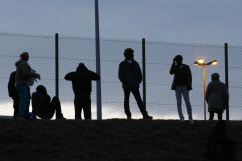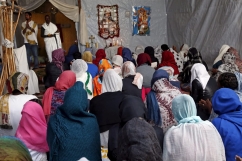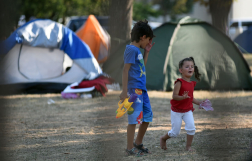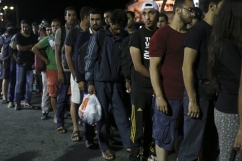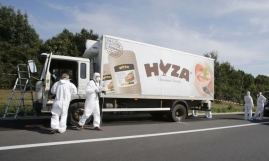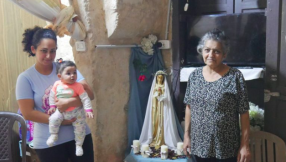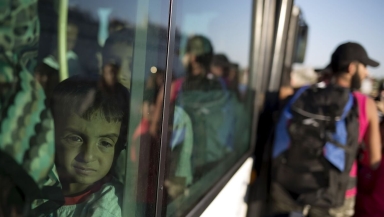
Three young children suffering from dehydration and close to death have been rescued from a van crammed with 26 refugees from Syria, Afghanistan and Bangladesh, Austrian police said on Saturday.
The two girls and a boy, aged five and six, were found in a dire state when police stopped the vehicle after a chase near the Austrian town of St. Peter am Hart on the border with Germany, a police spokesman said. They are recovering in hospital.
"The emergency doctor told us they would not have made it much longer - two, maybe three hours," said David Furtner, police spokesman for Upper Austria province.
The incident follows the discovery of the corpses of 71 refugees in an abandoned lorry on an Austrian highway on Thursday - victims of an unfolding tragedy as refugees and migrants escaping conflict and poverty in Africa, Asia and the Middle East flock to Europe in unprecedented numbers.
The International Organization for Migration estimates a third of a million people have crossed the Mediterranean so far this year, leaving from Libya, Turkey and other countries to land in Europe.
Hundreds have drowned in shipwrecks but the recent deaths on land have exposed another horrific side of the people-smuggling racket.
"The driver did not give a damn about the people in the back. We would not transport animals under these conditions on our roads in Austria," said Furtner, referring to Friday's discovery.
Austria lies on the way from poorer countries in southern and eastern Europe where many refugees first land, such as Greece, to more prosperous nations in the north and west.
DRIVER ARRESTED
The 29-year-old Romanian driver of the van found on Friday, registered in Romania, was arrested. The children and their parents were taken to the hospital in Braunau, where they are now in a stable condition.
Among the dead found in the lorry on Thursday, four were children, one of them a baby girl, police said on Saturday. They were presumed to be from Syria - in the grip of a four-year-old civil war - or possibly Afghanistan.
Three Bulgarians and an Afghan arrested in Hungary in connection with the deaths made their first appearance in a court in the central Hungarian town of Kecskemet on Saturday. They were given one month's detention pending further proceedings.
A prosecution spokesman told journalists the truck had left Kecskemet and picked up the migrants near Hungary's border with Serbia, before taking them through Hungary to Austria.
Police hoped to identify the dead refugees by examining mobile phones found on some of the bodies. Searches of backpacks, luggage and clothing had provided few clues apart from one Syrian travel document, said Helmut Marban, a police spokesman in Burgenland province.
Marban was speaking in front of a former customs hall where the lorry was parked on a tarpaulin to catch fluids, with investigators in protective suits gathering forensic evidence.
Police estimated the refugees could have been dead for up to two days and the truck might have been standing on the hard shoulder of the highway for as long as 24 hours.
"It seems unbelievable," said Marban, asked about how 71 people could have fitted into the medium-sized refrigeration lorry.
"At first when they got in they were of course standing, but when we had to bring them out they were (entangled) all together."
In nearby camps, refugees said the news had left them stunned, but they saw little choice but to flee to Europe.
"We had to walk so much, it was so dangerous, in the forest and in the water," said 21-year-old Qariburahman, who had been on the road for a month before Austrian police picked him up and brought him to the Nickelsdorf refugee reception centre.
"When I came from Afghanistan, about three people died on the way, the way is very dangerous," he said.
His journey had cost him $5,000.
A Syrian refugee in the camp of Traiskirchen south of Vienna said people had no choice but go with traffickers.
"We didn't know what the car was, maybe it's a truck, maybe it's a van. And we had to follow (the trafficker) because in his area, he is the boss," he said, his pregnant wife and baby son close by.
"My wife, she told me, oh maybe we were supposed to be one of them ... maybe it is one of my friends, maybe it is one of my brothers on that truck.'"
"MASS GRAVE"
On another front in the crisis, Libyan authorities arrested three people on suspicion of involvement in launching a boat packed with migrants that sank off the country's Mediterranean coast, killing up to 200 people, a security official said.
The vessel, with up to 400 African, Syrian and Asian migrants on board, capsized on Thursday after setting off from the town of Zuwara, close to the Italian island of Lampedusa and a centre of operations for people smugglers exploiting the anarchy in Libya, a country with two rival governments.
By Saturday, 115 bodies had been recovered and about 198 migrants rescued, officials said.
Arrests of smugglers are rare in Libya, where the judiciary has little power since the country is effectively controlled by former rebel groups which helped to oust Muammar Gaddafi in 2011.
The head of the European Parliament meanwhile said the "glaring failures" of some European countries to take in refugees were turning the Mediterranean into a mass grave.
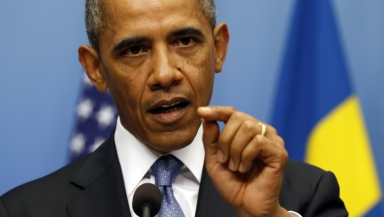
Martin Schulz, a German Social Democrat, said those European governments that had resisted European Union proposals to agree a common plan must do more to deal with the crisis.
He did not single out any states. However, Hungary, which is part of Europe's passport-free Schengen zone, is building a fence along its border with Serbia to contain what it calls a threat to European security, prosperity and identity.
"The Mediterranean becomes a mass grave, gruesome scenes play out at borders, there is mutual blame - and those in greatest need, seeking our protection, are left without help," Schulz told Germany's Die Welt newspaper.
Germany's highest court on Saturday overturned a weekend ban on assemblies in an eastern town that was the scene of violent protests against refugees. More than 30 policemen were injured in clashes in the town of Heidenhau, near Dresden, last weekend.
Chancellor Angela Merkel travelled to Heidenau on Monday and condemned the protests. Germany expects the number of asylum seekers to quadruple to about 800,000 this year.










